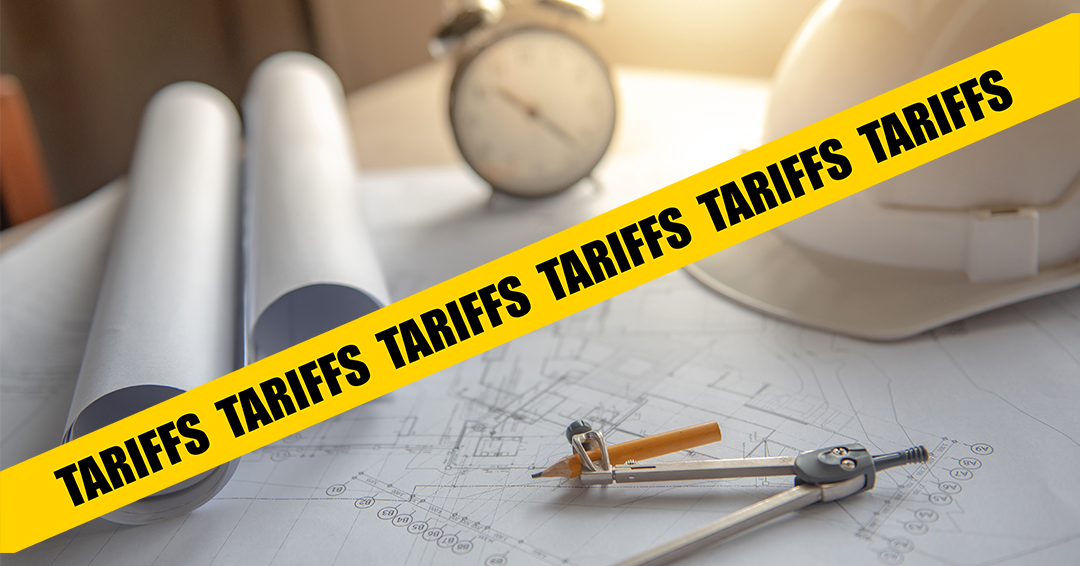
Concerned about Soaring Material Costs, Project Redesigns, or Delivery Delays?
Don’t Let Tariff Surprises Derail Your Project!
Join leading construction attorneys and architects for an engaging, solutions-focused session. Gain insight on how to protect your firm, your clients, and profits from the unpredictable impact of tariffs and other market shocks. Leave this webinar with actionable and proven strategies you can implement immediately, including the following:
- The real impact of tariffs on your project costs – and what you can do about it.
- Why standard contracts leave room for exposure
- Where familiar safeguards protections like force majeure can fall short
- Effective Negotiation tactics
- How legal counsel can be your strongest shield against risk
Who Should Attend?
Essential for Architects, project managers, contractors and anyone managing construction agreements in today’s challenging economy.
Pricing:
- AIA Member Price | $20.00
- Non Member Price | $40.00
Don’t miss out! – reserve your spot today for expert guidance to future-proof your projects!
JOIN US ON JUNE 24TH
MEET THE PANEL
Jeffrey Bright | Offit Kurman

Jeffrey Bright is a principal attorney in the firm’s Construction Practice Group. Jeff has a multi-state construction law practice and is licensed in Pennsylvania, Maryland, D.C., Virginia and California. With more than a 15 years of legal experience focused on the construction industry, he advises on construction contracts, project disputes and other legal issues that arise in the construction industry, including labor and employment law, real estate and prevailing wage.
Jeff routinely assists clients in redlining and negotiating construction contracts and has advised on hundreds of contract documents and negotiations. He prioritizes practical, solutions-oriented advice and has guided clients on various project delivery methods, including traditional design-bid-build, design-build, multi-prime, delegated design, CM as advisor, CM at risk, joint venture and sophisticated variations of cost-plus fee with GMP contracts. Read More
Mark Johnson | Offit Kurman

With over three decades of construction, environmental, and real estate litigation experience, Mark Johnson brings seasoned leadership to complex legal challenges. He has served as lead counsel in over 30 jury trials, bench trials, and high-stakes arbitrations, handling disputes across construction, environmental compliance, land use, landlord-tenant issues, oil and gas, real estate, and toxic torts.
Mark’s construction law practice encompasses representing owners, general contractors, subcontractors, and design professionals in private and public works disputes. His extensive experience includes resolving claims involving extra work, changed conditions, delays, loss of productivity, defective workmanship, product liability for construction materials, insurance coverage for construction defect claims and property damage claims, including fire damage claims, and California contractor licensing laws. He has successfully navigated construction disputes in state and federal courts across multiple states and before the federal Civilian Board of Contract Appeals and California’s Public Works Contract Arbitration program. Read More
Eric Booth, AIA | Desmone

As President of Desmone, an architecture and interior design firm with offices in Western Pennsylvania and West Virginia, Eric Booth strategizes, innovates and implements through all facets of the company. Eric strives to elevate the perception of the architecture profession by structuring the design process around the fundamental reason a building is constructed: to serve people. This conviction is evident as Eric led the Desmone team to pioneer the design and construction of a 25,000 SF office addition, Pittsburgh’s first WELL Gold certified office space. Read More
Chris Brand, AIA

Chris Brand is a licensed architect with over fifteen years of applied experience. He is known for his strong technical skills paired with a methodical and meticulous approach to his work. He is motivated to pursue architectural work that receives community support and recognition, while offering access and opportunities, particularly for projects that touch the educational sector and limit the financial barrier to inclusion. This focus has led to his participation in several specialized vocational and technology-driven spaces, including the Hudson County Schools of Technology’s Liberty High School and Bergen Community College’s STEM Student Research Center – a facility that was opened to great reception from the community, provided research grants that were not made previously-available, and allowed students to learn using cutting-edge equipment.
Chris’ passion for the industry is also apparent through his involvement in the American Institute of Architects (AIA); his service as President for the Architects League of Northern New Jersey (ALNNJ); his participation in the AIA-NJ’s K-12 committee, and where he helps to endow scholarships to students who are pursuing architecture.
Thomas O’Gara

Thomas (Tom) O’Gara joined LeChase as general counsel in 2017 and was named senior vice president in 2022. In his role, he is responsible for the oversight of a variety of LeChase’s functional departments. Prior to working at LeChase, Tom was a partner in a Rochester law firm where he concentrated his practice on construction litigation and represented LeChase as outside counsel on several legal matters. He has experience in commercial litigation, contract law, insurance, surety law and general construction matters. Tom is a cum laude graduate of both Albany Law School of Union University (J.D.) and Siena College (B.A). In 2021, Tom was among the honorees at Rochester’s Legal Excellence Awards, being recognized in the In-House Counsel category. He is on the Board of Directors for the American Heart Association, is former chairman of the planning board for the Village of Fairport and serves as a member of the Associated General Contractors (AGC) In-House Counsel Group.
